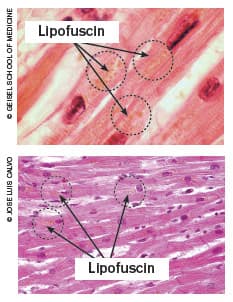Life Extension Magazine®

A naturally occurring organic acid known as creatine has long been used by athletes to boost their performance and build muscle strength without steroids. But emerging research is showing that creatine also has important anti-aging effects in vital tissues throughout the body.
As we age, the unique benefits of creatine become more pronounced. From protection against cognitive decline and congestive heart failure to reducing insulin levels and shielding against muscle loss, creatine enhances mitochondrial function that helps reduce the ravages of aging.
Recently, creatine has been found to significantly lower the accumulation of a recognized marker of aging called lipofuscin in the brains of aging mice.1 As a result, creatine-fed mice lived an average of 9% longer than control animals— that’s equivalent to more than seven years for an average human!1
The supplemented animals also performed significantly better on neurobehavioral testing.1,2 In fact, creatine is now being hailed by experts as “a starting-point for a novel means of delaying neurodegenerative disease, and/or for strengthening memory function and intellectual capabilities.”3
Because of creatine’s vital impact on your body’s energy levels, it should be considered for anyone interested in slowing aging, improving energy levels, and fighting off age-related diseases.
Creatine’s High-Energy Impact

In order to understand how creatine can have such a powerful impact on a wide range of functions within the body, you have to understand the key role that creatine plays in cellular energy supplies.
Mitochondria are found in every cell and are responsible for converting food into the energy the body needs in order to function. Aging leads to the accumulation of dysfunctional mitochondria.4
The loss of mitochondrial function can cause the buildup of aging pigments known as lipofuscin. Lipofuscin builds up when a cellular “garbage-disposal system” (i.e., autophagy) breaks down. Eventually, with the decrease in autophagy and related increase in lipofuscin, there is increased oxidative stress, decreased energy production, and ultimately, cell death.5-7
In studies, creatine has been found to help boost cellular energy and to significantly lower accumulation of lipofuscin in the brains of aging mice.1,8 Creatine also helps maintain adequate levels of high-energy phosphate-containing molecules in tissues with especially high energy consumption, such as the heart, brain, and muscle.9-11 High levels of creatine support the body’s production of ATP, the universal energy-transfer molecule, when ATP itself is used up by these power-hungry tissues.8,12,13
Ultimately, supplementing with creatine helps restore the energy loss that is at the root of many age-related diseases. As you’ll see in the next sections, creatine supplementation has a positive impact on everything from cognitive decline to cardiovascular health.
Creatine Provides Energetic Solutions To Cognitive Decline
Many brain disorders involve a disruption of the brain’s energy supply systems. That applies not only to chronic, age-related diseases such as Parkinson’s, Alzheimer’s, and Huntington’s, but also to acute conditions such as strokes and traumatic brain and spinal cord injuries.14 Creatine’s role as an energy-enhancer suggests it may be helpful in all of these conditions.15
In addition, this energy loss leads to the accumulation of the damaging lipofuscin pigments that are present in all of these neurodegenerative diseases.16-18 Creatine’s ability to lower the accumulation of this aging pigment offers promise in the treatment of these cognitive diseases.1
Here’s a rundown on what we know about creatine supplementation in brain diseases associated with aging:
Alzheimer’s disease primarily affects memory and cognition, with debilitating loss of the ability to recognize loved ones, to navigate even around the home, and to sustain meaningful conversations.19
Creatine supplementation shows promise in addressing the underlying causes of this disease—especially when given in the early stages.12 This is due in large part to creatine’s role as an energy enhancer. That’s because energy loss from dysfunctional mitochondria plays a major role in this disease—and causes damaging lipofuscin pigments to accumulate as a result.16,20
Creatine also protects brain cells against the root cause of this energy loss, namely the excitotoxicity that is a hallmark of neurodegenerative diseases in general, and against the toxic Abeta proteins that are unique to Alzheimer’s.21 Creatine protects against this toxicity, which impairs mitochondrial energy production.12,15
Parkinson’s disease is a disorder of movement control in the brain; it produces tremors, slowed movements, and a characteristic “mask-like” face. Advanced Parkinson’s disease can also include dementia, with symptoms similar to Alzheimer’s.19,22
Creatine can have a positive effect on a number of the factors involved in this disease. For starters, brain tissue from both humans and animals with Parkinson’s disease show abnormally high levels of telltale lipofuscin pigment. This indicates that problems with cellular energy management and waste control are underlying factors in the disease.17,20 As we’ve discussed, creatine has been found to lower the accumulation of lipofuscin.
Creatine also enhances the survival and protection of neurons that produce dopamine, the missing transmitter in the disease.11,23 Studies have shown that creatine improves patient mood, allows smaller doses of medication to be used, and also reduces the side effects of those meds.24,25 This is especially noteworthy for Parkinson’s patients, since the most commonly prescribed medication for Parkinson’s ( L-DOPA, a precursor to dopamine) causes disturbing side effects including out-of-control movements.26
Huntington’s disease is a genetic neurodegenerative disorder that involves damage to motor control centers in the brain, and symptoms include wild, out-of-control movements.8
As with the other disorders, the brain cells of Huntington’s patients display excessive amounts of the aging pigment lipofuscin—indicating underlying problems with cellular energy.1,18 This suggests creatine may be an important component in the battle against this disease.
What You Need To Know
 |
Creatine
- Creatine has long been used successfully by athletes to improve performance and combat fatigue; it is now showing promise in strengthening the hearts and minds of older adults.
- Supplementing with creatine may delay the impact of Parkinson’s, Huntington’s, and other neurodegenerative diseases.
- Glucose tolerance may also be improved by creatine supplementation.
- Creatine reduces the accumulation of lipofuscin, “the aging pigment,” in internal organs. Lipofuscin exacerbates the aging process through oxidative stress.
- Creatine has such an impressive record of performance and safety that some experts now routinely recommend supplementation for older adults.
Remarkably, creatine supplementation has been shown to offer considerable neuroprotection even after the onset of symptoms in animal studies.27 Supplemented animals also survived significantly longer than controls when creatine was provided in the early and middle stages of the disease. These effects were directly attributed to creatine’s ability to increase brain levels of energy in the form of stored ATP.
Mice with experimental Huntington’s disease that were supplemented with creatine showed slower loss of brain tissue and delayed accumulations of the destructive protein gene huntingtin.24 Supplemented animals also had improvements in body weight and motor performance, and slower onset of diabetes.28
Amyotrophic Lateral Sclerosis (ALS) is a devastating neurodegenerative disease that can strike without warning at almost any age. Sometimes referred to as Lou Gehrig’s disease, it is closely associated with mitochondrial dysfunction in the brain cells that control voluntary movement, resulting in weakening and eventually atrophy of skeletal muscles.29 Respiratory failure is the major cause of death in ALS patients.30
Although it is considered an untreatable condition, creatine could offer symptomatic treatment for those suffering from ALS. In human patients, creatine supplementation at 20 grams/day for seven days, followed by 3 grams /day for up to six months, increased voluntary muscle contractions at the knee in 70% of patients, and at the elbow in 53% of patients.31 These improvements wore off after six months; however, the researchers concluded that creatine can at least temporarily boost muscle power in ALS patients.
This beneficial effect may be due to creatine’s impact on the neurotransmitter glutamate.32 The overstimulation of glutamate leads to excitotoxicity, which is a phenomenon implicated in ALS.33 Animal research showed that creatine helps reduce increases in brain levels of glutamate. Supplemented animals also survived longer and performed better on motor tests.34,35
Strokes most often occur as a result of insufficient blood supply to areas of the brain. Decreased blood flow to the brain is associated with excessive amounts of lipofuscin (the aging pigment).36 This suggests stroke damage at the cellular level is not unlike that of degenerative diseases of the brain—and indicates that creatine’s ability to lower the accumulation of this aging pigment may make it beneficial for stroke victims as well.
Mouse studies of creatine supplementation show marked reduction in the size of damaged areas after blood flow to the brain is interrupted by a stroke.10 In addition, creatine supplementation also replenished ATP in the brain that had been depleted as a result of stroke. Human studies of creatine in stroke victims are not yet available. However, given creatine’s strong safety record, researchers recommend that people at high risk for strokes consider supplementing with creatine.10

Cognitive functioning in normal adults is also favorably affected by creatine supplementation. Creatine’s widespread benefits on muscle fatigue prompted one group of researchers to focus on its ability to improve mental fatigue as well.37 At a dose of 8 grams/day for five days, the supplement reduced mental fatigue induced by repeated mathematical calculations. Tests showed that the subjects’ brains utilized more oxygen after supplementation, a measure of enhanced energy use.
Older adults taking 5 grams of creatine, four times daily, performed better on tasks of memory and cognition.38,39
The cognition-enhancing effects of creatine seem to be especially strong in tasks that require a rapid speed of processing, such as deciding quickly whether it’s safe to cross a street, or in distinguishing a friendly face from a potentially threatening one.40 Following extended sleep deprivation (up to 36 hours), creatine supplementation also improved performance of complex “executive” tasks involving decision-making skills.41
Most of the data on these diseases are at present derived from animal studies or basic lab studies, but large human trials are in the pipeline. However, given creatine’s impressive safety record as an energy-enhancer in humans during exercise, many experts are recommending that older adults, especially those at high risk for acute brain injuries such as stroke, should begin regular supplementation with creatine.
Reduce The Signs Of Internal Aging
 |
Lipofuscin Accumulation: Aging You Can’t See
Microscopic photographs of heart cells with accumulations of yellow-brown lipofuscin. Collections of lipofuscin represent age-related breakdown in cellular garbage-disposal systems and cause accelerated oxidative damage, reduced energy production, and premature cell death.
Did you know that aging tissues, even those deep within our bodies, develop physical and biochemical changes remarkably similar to the ones we can see from the outside?
It’s true. Take liver spots, for example. These brownish blemishes are examples of external aging and represent accumulations of pigments from generations of broken-down skin cells.
In the microscopic photographs above, you can see nearly identical pigment accumulations in the tissues of the heart. Known as lipofuscin (“the aging pigment”) these pigment collections provide stark evidence of internal aging. Lipofuscin builds up when a cellular garbage-disposal system (autophagy) breaks down. Eventually, with the decrease in autophagy and related increase in lipofuscin, there is increased oxidative stress, decreased energy production, and ultimately, cell death.5,6
But you don’t have to sit idly by as your body fills with these age-induced garbage collections. Creatine has recently been found to significantly lower accumulation of lipofuscin in brains of aging mice.1
As a result, creatine-fed mice lived an average of 9% longer than control animals— that’s equivalent to more than seven years for an average human!1 The supplemented animals also performed significantly better on neurobehavioral testing.1,2
Cardiovascular Effects Of Creatine Supplementation
Creatine supplementation clearly improves skeletal muscle performance in healthy athletes and older adults.42-44 That has led scientists to consider whether creatine could also function as an energy-enhancer for the most important muscle in the body: the heart. Numerous studies in both animals and humans indicate that it can.
In animal studies, creatine supplementation restored ATP levels in animals subjected to energy-reducing cardiac stress; it also reduced markers of heart muscle exhaustion.45 Other studies show similar effects, even in unstressed animals.46
Human studies of creatine supplementation remain few, but the results are promising. In one study, patients with chronic congestive heart failure took high doses (20 grams/day) of creatine for 10 days, undergoing cardiac and exercise testing before and after the supplementation period. Supplemented patients had significantly increased levels of energy-rich creatine phosphate in their muscles compared with controls, and they performed as much as 21% better on exercise cycle testing.47
In a similar study in patients with congestive heart failure, those taking creatine almost doubled the number of handgrip exercises. They also significantly reduced the amount of muscle waste products they produced.48 Since those with congestive heart failure typically experience reduced exercise tolerance,48 these improvements bode well for creatine as an enhancer of mobility and quality of life for these patients.49,50
Contraindications Of Creatine Monohydrate?
 |
Hundreds of studies to date have shown that creatine monohydrate is an amazingly non-toxic and safe supplement with numerous benefits. Further studies directly examining possible side effects, both prospective and long-term retrospective (up to five years), have failed to find any serious side effects of creatine supplementation65-69 on various markers studied, such as renal function, hepatic function, and others. So are there contraindications of creatine monohydrate?
Although creatine monohydrate is clearly safe for healthy people with a very low side-effects profile using up to 10 grams per day, are there specific groups who should not use it?
Again, the data suggest very few actual contraindications. The only people who should avoid creatine supplements are those with a history of renal disease and/or those taking nephrotoxic (poisonous to the kidneys) medications. There’s been a handful of case reports that show very high doses of creatine (and the reports were not always clear as to what form of creatine was used) were associated with kidney dysfunction.70 Typical for such a simple case report, it’s unclear what other medications were involved or pre-existing medical condition existed.
However tenuous the connection between high-dose creatine monohydrate and pre-existing kidney dysfunction, it’s prudent to advise people with a history of renal disease and/or those taking nephrotoxic medications to avoid creatine supplementation until more data exists examining that connection. As creatine monohydrate supplementation may cause a transient increase in creatinine levels in some individuals, it may act as a false indicator of renal dysfunction.
Creatine Shows Potential In Managing Blood Sugar And Insulin Levels
One natural consequence of creatine’s ability to boost muscle energy levels is a subsequent increase in your body’s ability to utilize glucose as metabolic fuel.51 Creatine has long been known to lower blood glucose levels in healthy patients. Now, studies are beginning to appear that indicate creatine’s blood- sugar benefits in diabetic patients as well.
In humans, creatine supplementation markedly increased the production of the glucose transporter complex called GLUT-4, which shuttles sugar molecules from the blood into cells and on to mitochondria.52 Animal studies show similar phenomena, along with lowered blood glucose and reduced plasma insulin levels.51 This is a critically important point, because elevated insulin levels are associated with diseases such as cancer and atherosclerosis.5,53,54
In sedentary but otherwise healthy men, 10 grams/day of creatine along with moderate exercise produced significant improvements in oral glucose tolerance test results.55 A study published in 2011 showed that diabetics taking creatine supplements combined with exercise experienced similar improvements in blood sugar, glucose tolerance testing, and hemoglobin A1c, the measure of glucose exposure over long periods.56
Creatine: Protecting Older Adults From Muscle Loss
As we age, we tend to become increasingly sedentary. Combine that with age-related changes to our biology, and the result is typically the loss of healthy muscle mass, known as sarcopenia.57,58 Muscle loss can be serious—especially when combined with poor cognition and balance—as it increases your risk of falling. And of course, weakened bones increase the risk of a serious injury in a fall.59
Several studies now support the use of creatine supplementation to enhance lean body mass, muscular performance, and fatigue resistance in young adults.58,60,61 These benefits are of equal interest for older people.
New research shows that supplementing with approximately 5 to 20 grams/day could provide major benefits for older people. Supplementation produces significant improvements in the ability to perform short-lived but high-energy actions, such as those involved in sitting down and rising up again from a chair, in which a person must lower and then raise their entire body weight in a short period.62 Other studies show improvement in grip strength.63 While exercise is helpful, many studies show that creatine is beneficial even in the absence of such training.58
A small but growing body of evidence suggests that creatine may improve bone mineral density and strength, particularly if combined with resistance exercise.58
The evidence for creatine supplementation is now so great that one expert has written, “Physicians should strongly consider advising older adults to supplement with creatine and to begin a resistance training regime in an effort to enhance skeletal muscle strength and hypertrophy, resulting in enhanced quality of life.”64
Summary
Long used by athletes as an energy-enhancing aid, creatine is increasingly showing promise in diseases that involve deterioration of the energy balance in our bodies. These include neurodegenerative diseases, especially Parkinson’s and Huntington’s diseases, as well as heart disease and diabetes. And animal studies reveal significant extension of the life span in older animals supplemented with creatine.34,35
Our bodies run on energy. We extract that energy from food, and then move and store it in tissues for immediate release. As we get older, however, our energy-storing and energy-moving apparatus begin to fail, and byproducts begin to accumulate. Creatine helps the body transfer energy and provide energy to tissues that have very high energy demands, such as the brain, heart, and muscle.
Research on creatine as a life-extender in humans is in its infancy, but the existing evidence of its efficacy, combined with its strong safety record, make it an interesting supplement for adults to consider who seek to slow aging and fend off its consequences.
If you have any questions on the scientific content of this article, please call a Life Extension® Health Advisor at 1-866-864-3027.
References
- Klopstock T, Elstner M, Bender A. Creatine in mouse models of neurodegeneration and aging. Amino Acids. 2011 May;40(5):1297-303.
- Bender A, Beckers J, Schneider I, et al. Creatine improves health and survival of mice. Neurobiol Aging. 2008 Sep;29(9):1404-11.
- Wyss M, Schulze A. Health implications of creatine: can oral creatine supplementation protect against neurological and atherosclerotic disease? Neuroscience. 2002;112(2):243-60.
- Giordano S, Darley-Usmar V, Zhang J. Autophagy as an essential cellular antioxidant pathway in neurodegenerative disease. Redox Biol. 2013 Dec 25;2:82-90.
- De Meyer GR, De Keulenaer GW, Martinet W. Role of autophagy in heart failure associated with aging. Heart Fail Rev. 2010 Sep;15(5):423-30.
- Petrovski G, Das DK. Does autophagy take a front seat in lifespan extension? J Cell Mol Med. 2010 Nov;14(11):2543-51.
- Terman A 1, Brunk UT. Lipofuscin. Int J Biochem Cell Biol. 2004 Aug;36(8):1400-4.
- Andres RH, Ducray AD, Huber AW, et al. Effects of creatine treatment on survival and differentiation of GABA-ergic neurons in cultured striatal tissue. J Neurochem. 2005 Oct;95(1):33-45.
- Hausmann ON, Fouad K, Wallimann T, Schwab ME. Protective effects of oral creatine supplementation on spinal cord injury in rats. Spinal Cord. 2002 Sep;40(9):449-56.
- Zhu S, Li M, Figueroa BE, et al. Prophylactic creatine administration mediates neuroprotection in cerebral ischemia in mice. J Neurosci. 2004 Jun 30;24(26):5909-12.
- Andres RH, Ducray AD, Perez-Bouza A, et al. Creatine supplementation improves dopaminergic cell survival and protects against MPP+ toxicity in an organotypic tissue culture system. Cell Transplant. 2005;14(8):537-50.
- Adhihetty PJ, Beal MF. Creatine and its potential therapeutic value for targeting cellular energy impairment in neurodegenerative diseases. Neuromolecular Med. 2008;10(4):275-90.
- Andres RH, Ducray AD, Schlattner U, Wallimann T, Widmer HR. Functions and effects of creatine in the central nervous system. Brain Res Bull. 2008 Jul 1;76(4):329-43.
- Khatri N, Man HY. Synaptic Activity and Bioenergy Homeostasis: Implications in Brain Trauma and Neurodegenerative Diseases. Front Neurol. 2013 Dec 11;4:199.
- Klein AM, Ferrante RJ. The neuroprotective role of creatine. Subcell Biochem. 2007;46:205-43.
- Moreira PI, Carvalho C, Zhu X, Smith MA, Perry G. Mitochondrial dysfunction is a trigger of Alzheimer’s disease pathophysiology. Biochim Biophys Acta. 2010 Jan;1802(1):2-10.
- Meredith GE, Totterdell S, Petroske E, Santa Cruz K, Callison RC, Jr., Lau YS. Lysosomal malfunction accompanies alpha-synuclein aggregation in a progressive mouse model of Parkinson’s disease. Brain Res. 2002 Nov 22;956(1):156-65.
- Stack EC, Matson WR, Ferrante RJ. Evidence of oxidant damage in Huntington’s disease: translational strategies using antioxidants. Ann N Y Acad Sci. 2008 Dec;1147:79-92.
- Nussbaum RL , Ellis CE. Alzheimer’s disease and Parkinson’s disease. Engl J Med. 2003 Apr 3;348(14):1356-64.
- Arduino DM, Esteves AR, Silva DF, et al. Therapeutic intervention at cellular quality control systems in Alzheimer’s and Parkinson’s diseases. Curr Pharm Des. 2011;17(31):3446-59.
- Brewer GJ, Wallimann TW. Protective effect of the energy precursor creatine against toxicity of glutamate and beta-amyloid in rat hippocampal neurons. J Neurochem. 2000 May;74(5):1968-78.
- Korczyn AD . Dementia in Parkinson’s disease. J Neurol. 2001 Sep;248 Suppl 3:III1-4.
- Andres RH, Huber AW, Schlattner U, et al. Effects of creatine treatment on the survival of dopaminergic neurons in cultured fetal ventral mesencephalic tissue. Neuroscience. 2005;133(3):701-13.
- Bender A, Koch W, Elstner M, et al. Creatine supplementation in Parkinson disease: a placebo-controlled randomized pilot trial. Neurology. 2006 Oct 10;67(7):1262-4.
- Valastro B, Dekundy A, Danysz W, Quack G. Oral creatine supplementation attenuates L-DOPA-induced dyskinesia in 6-hydroxydopamine-lesioned rats. Behav Brain Res. 2009 Jan 30;197(1):90-6.
- Available at: https://pubs.acs.org/cen/coverstory/83/8325/8325l-dopa.html. Accessed April 3, 2014.
- Dedeoglu A, Kubilus JK, Yang L, et al. Creatine therapy provides neuroprotection after onset of clinical symptoms in Huntington’s disease transgenic mice. J Neurochem. 2003 Jun;85(6):1359-67.
- Ferrante RJ, Andreassen OA, Jenkins BG, et al. Neuroprotective effects of creatine in a transgenic mouse model of Huntington’s disease. J Neurosci. 2000 Jun 15;20(12):4389-97.
- Ellis AC, Rosenfeld J. The role of creatine in the management of amyotrophic lateral sclerosis and other neurodegenerative disorders. CNS Drugs. 2004;18(14):967-80.
- Gil J , Funalot B, Verschueren A, et al. Causes of death amongst French patients with amyotrophic lateral sclerosis: a prospective study. Eur J Neurol. 2008 Nov;15(11):1245-51.
- Mazzini L, Balzarini C, Colombo R, et al. Effects of creatine supplementation on exercise performance and muscular strength in amyotrophic lateral sclerosis: preliminary results. J Neurol Sci. 2001 Oct 15;191(1-2):139-44.
- Choi JK, Kustermann E, Dedeoglu A, Jenkins BG. Magnetic resonance spectroscopy of regional brain metabolite markers in FALS mice and the effects of dietary creatine supplementation. Eur J Neurosci. 2009 Dec;30(11):2143-50.
- Foran E , Trotti D. Glutamate transporters and the excitotoxic path to motor neuron degeneration in amyotrophic lateral sclerosis. Antioxid Redox Signal. 2009 Jul;11(7):1587-602.
- Andreassen OA, Jenkins BG, Dedeoglu A, et al. Increases in cortical glutamate concentrations in transgenic amyotrophic lateral sclerosis mice are attenuated by creatine supplementation. J Neurochem. 2001 Apr;77(2):383-90.
- Pena-Altamira E, Crochemore C, Virgili M, Contestabile A. Neurochemical correlates of differential neuroprotection by long-term dietary creatine supplementation. Brain Res. 2005 Oct 5;1058(1-2):183-8.
- Sekhon LH, Morgan MK, Spence I, Weber NC. Chronic cerebral hypoperfusion: pathological and behavioral consequences. Neurosurgery. 1997 Mar;40(3):548-56.
- Watanabe A, Kato N, Kato T. Effects of creatine on mental fatigue and cerebral hemoglobin oxygenation. Neurosci Res. 2002 Apr;42(4):279-85.
- McMorris T, Mielcarz G, Harris RC, Swain JP, Howard A. Creatine supplementation and cognitive performance in elderly individuals. Neuropsychol Dev Cogn B Aging Neuropsychol Cogn. 2007 Sep;14(5):517-28.
- Benton D, Donohoe R. The influence of creatine supplementation on the cognitive functioning of vegetarians and omnivores. Br J Nutr. 2011 Apr;105(7):1100-5.
- Rae C, Digney AL, McEwan SR, Bates TC. Oral creatine monohydrate supplementation improves brain performance: a double-blind, placebo-controlled, cross-over trial. Proc Biol Sci. 2003 Oct 22;270(1529):2147-50.
- McMorris T, Harris RC, Howard AN, et al. Creatine supplementation, sleep deprivation, cortisol, melatonin and behavior. Physiol Behav. 2007 Jan 30;90(1):21-8.
- Fukuda DH , Smith AE, Kendall KL, et al.The effects of creatine loading and gender on anaerobic running capacity. J Strength Cond Res. 2010 Jul;24(7):1826-33.
- Izquierdo M , Ibañez J,González-Badillo JJ, Gorostiaga EM. Effects of creatine supplementation on muscle power, endurance, and sprint performance. Med Sci Sports Exerc. 2002 Feb;34(2):332-4.
- Aguiar AF , Januário RS, Junior RP, et al. Long-term creatine supplementation improves muscular performance during resistance training in older women. Eur J Appl Physiol. 2013 Apr;113(4):987-96.
- Constantin-Teodosiu D, Greenhaff PL, Gardiner SM, Randall MD, March JE, Bennett T. Attenuation by creatine of myocardial metabolic stress in Brattleboro rats caused by chronic inhibition of nitric oxide synthase. Br J Pharmacol. 1995 Dec;116(8):3288-92.
- Brzezinska Z, Nazar K, Kaciuba-Uscilko H, Falecka-Wieczorek I, Wojcik-Ziolkowska E. Effect of a short-term dietary creatine supplementation on high-energy phosphates in the rat myocardium. J Physiol Pharmacol. 1998 Dec;49(4):591-5.
- Gordon A, Hultman E, Kaijser L, et al. Creatine supplementation in chronic heart failure increases skeletal muscle creatine phosphate and muscle performance. Cardiovasc Res. 1995 Sep;30(3):413-8.
- Andrews R, Greenhaff P, Curtis S, Perry A, Cowley AJ. The effect of dietary creatine supplementation on skeletal muscle metabolism in congestive heart failure. Eur Heart J. 1998 Apr;19(4):617-22.
- Fuld JP, Kilduff LP, Neder JA, et al. Creatine supplementation during pulmonary rehabilitation in chronic obstructive pulmonary disease. Thorax. 2005 Jul;60(7):531-7.
- Kuethe F, Krack A, Richartz BM, Figulla HR. Creatine supplementation improves muscle strength in patients with congestive heart failure. Pharmazie. 2006 Mar;61(3):218-22.
- Op’t Eijnde B, Jijakli H, Hespel P, Malaisse WJ. Creatine supplementation increases soleus muscle creatine content and lowers the insulinogenic index in an animal model of inherited type 2 diabetes. Int J Mol Med. 2006 Jun;17(6):1077-84.
- Op’t Eijnde B, Urso B, Richter EA, Greenhaff PL, Hespel P. Effect of oral creatine supplementation on human muscle GLUT4 protein content after immobilization. Diabetes. 2001 Jan;50(1):18-23.
- Avogaro A. Insulin resistance: trigger or concomitant factor in the metabolic syndrome. Panminerva Med. 2006 Mar;48(1):3-12.
- Jalving M, Gietema JA, Lefrandt JD, et al. Metformin: taking away the candy for cancer? Eur J Cancer. 2010 Sep;46(13):2369-80.
- Gualano B, Novaes RB, Artioli GG, et al. Effects of creatine supplementation on glucose tolerance and insulin sensitivity in sedentary healthy males undergoing aerobic training. Amino Acids. 2008 Feb;34(2):245-50.
- Gualano B, V DESP, Roschel H, et al. Creatine in type 2 diabetes: a randomized, double-blind, placebo-controlled trial. Med Sci Sports Exerc. 2011 May;43(5):770-8.
- Forbes SC, Little JP, Candow DG. Exercise and nutritional interventions for improving aging muscle health. Endocrine. 2012 Aug;42(1):29-38.
- Rawson ES, Venezia AC. Use of creatine in the elderly and evidence for effects on cognitive function in young and old. Amino Acids. 2011 May;40(5):1349-62.
- Gotshalk LA, Kraemer WJ, Mendonca MA, et al. Creatine supplementation improves muscular performance in older women. Eur J Appl Physiol. 2008 Jan;102(2):223-31.
- Jager R, Purpura M, Shao A, Inoue T, Kreider RB. Analysis of the efficacy, safety, and regulatory status of novel forms of creatine. Amino Acids. 2011 May;40(5):1369-83.
- Graef JL, Smith AE, Kendall KL, et al. The effects of four weeks of creatine supplementation and high-intensity interval training on cardiorespiratory fitness: a randomized controlled trial. J Int Soc Sports Nutr. 2009;6:18.
- Canete S, San Juan AF, Perez M, et al. Does creatine supplementation improve functional capacity in elderly women? J Strength Cond Res. 2006 Feb;20(1):22-8.
- Stout JR, Sue Graves B, Cramer JT, et al. Effects of creatine supplementation on the onset of neuromuscular fatigue threshold and muscle strength in elderly men and women (64 - 86 years). J Nutr Health Aging. 2007 Nov-Dec;11(6):459-64.
- Dalbo VJ, Roberts MD, Lockwood CM, Tucker PS, Kreider RB, Kerksick CM. The effects of age on skeletal muscle and the phosphocreatine energy system: can creatine supplementation help older adults. Dyn Med. 2009;8:6.
- Boyd DB. Insulin and cancer. Integr Cancer Ther. 2003 Dec;2(4):315-29.
- Kreider RB, et al. Long-term creatine supplementation does not significantly affect clinical markers of health in athletes. Mol Cell Biochem. 2003 Feb;244(1-2):95-104.
- Poortmans JR, Francaux M. Adverse effects of creatine supplementation: fact or fiction? Sports Med. 2000 Sep;30(3):155-70.
- Robinson TM, et al. Dietary creatine supplementation does not affect some haematological indices, or indices of muscle damage and hepatic and renal function. Br J Sports Med. 2000 Aug;34(4):284-8.
- Terjung RL, et al. American College of Sports Medicine roundtable. The physiological and health effects of oral creatine supplementation. Med Sci Sports Exerc. 2000 Mar;32(3):706-17.
- Groeneveld GJ1, et al. Few adverse effects of long-term creatine supplementation in a placebo-controlled trial. Int J Sports Med. 2005 May;26(4):307-13.
- Yoshizumi WM1, Tsourounis C. Effects of creatine supplementation on renal function. J Herb Pharmacother. 2004;4(1):1-7.

